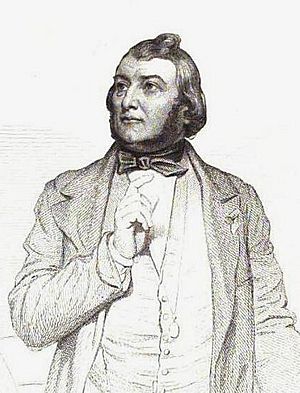Jacques Jasmin facts for kids
Quick facts for kids
Jacques Jasmin
|
|
|---|---|
 |
|
| Born | Jacques Boé 16 March 1798 |
| Died | 4 October 1864 (aged 66) |
| Pen name | Jansemin |
| Language | Occitan |
| Nationality | French |
| Genre | poetry |
Jansemin (born Jacques Boé), also known as Jasmin, was a famous Occitan poet. He was born on March 16, 1798, and passed away on October 4, 1864.
Contents
Early Life & Hairdressing Career
Jacques Boé was born in Agen, France. His father was a tailor who also wrote simple rhyming songs. He would sing these songs at fairs and gatherings. Young Jacques often went with his father, which helped him learn about being a poet from a young age.
When he was 16, Jacques started working at a hairdresser's shop. Later, he opened his own hairdressing business in Agen.
Becoming a Poet & Public Readings
In 1825, Jansemin published his first book of poems called Papillotos, which means Curl Papers. This book had poems in both French and the local Occitan language spoken in Agen. He became very successful writing in Occitan, which was the language of everyday people.
Jansemin was an important poet who helped bring the Occitan language back into literature. He did this by giving public readings of his poems. He was a great speaker and performer, much like the old troubadours and jongleurs who traveled and told stories.
In 1835, he read his poem "The Blind Girl of Castel-Cuill" in Bordeaux. The next year, he read it in Toulouse. People loved his performances in both cities. Jansemin often used the money he earned from these readings to help good causes, like restoring a church.
His Famous Poems
Jansemin published four books of Papillotos during his lifetime. These books included many well-known poems. Some of his most famous works are "The Charivari," "My Recollections," "The Blind Girl," "Francounetto," "Martha the Simple," and "The Twin Brothers."
Most of these poems, except "The Charivari," tell touching stories about ordinary life. Jansemin was not a fast writer. He took his time with each poem to make sure every feeling was expressed clearly and naturally. A line from his poem "The Third of May," written for Henry IV of France, is even carved on the statue of the king in Nérac.
Awards and Recognition
Jansemin received many honors for his poetry. In 1852, the Académie Française (a famous French council for the arts) praised his work and gave him a special pension. A medal was made for him with the words: Au poète moral et populaire (To the moral and popular poet).
He also received the title Maistre es Jeu from the Academy of Toulouse. This honor is only given to very important writers. Even Pope Pius IX recognized him, sending him the award of a knight of St Gregory the Great. Jansemin was also made a chevalier of the Légion d'honneur, which is one of France's highest awards.
Later Life
In his later years, Jansemin lived on a small property he bought near Agen. He called it Papillotos, named after his famous books. He wrote about this home in his poem "Ma Bigno" (My Vine).
Even though he was asked to represent his hometown in politics, he chose not to. He preferred the quiet life in the countryside, believing he was not suited for political honors. Jansemin passed away in 1864. His last poem, a response to writer Ernest Renan, was placed in his hands in his coffin.
See also
 In Spanish: Jasmin (poeta) para niños
In Spanish: Jasmin (poeta) para niños
 | Roy Wilkins |
 | John Lewis |
 | Linda Carol Brown |

